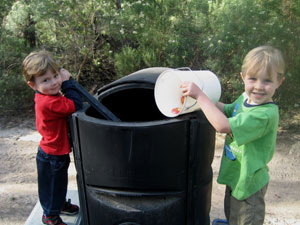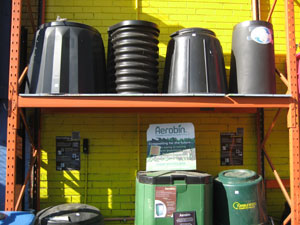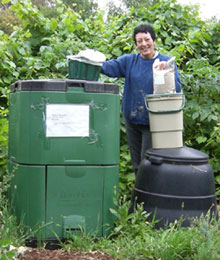
Firstly… what is compost? Essentially, compost is a mixture of decaying organic matter, generally comprised of leaves, cuttings, kitchen scraps and manures. Now, people do put strange things in their compost, and do odd things with the finished product, but hopefully, by the end of this article, we will all be on the same page!
Compost excites me greatly, much to the horror of my nearest and dearest! There is a whole little world happening inside my compost heap – life, death, decomposition, heat, relationships… amazing, and much more interesting than my own existence. Thing is, I know it’s happening, but I can’t necessarily see it. I do see the results though, when my forgotten Iceberg lettuce and Sunday papers end up as beautiful, rich, crumbly compost (after a number of weeks).
What’s the point to all this?
Apart from allowing me to live a fascinating life vicariously through the microbes in my heap, compost is surely the greatest garden invention of all time (heaps better than those giant plastic rake hands, cheap tools and robot lawn mowers!). Why? Because it improves my soil, and the state of the planet.
All soil types benefit from the addition of compost, as the presence of organic material in the soil introduces microbes (little microscopic critters who are essential to a healthy soil), that break down the compost. In turn, this brings worms into the soil to feed on the microbes. And as we all know, worms are the gardener’s best friend! They are so industrious that in a short period of time their activity can greatly improve any soil type… go the worms!!!!

The water retention in light, sandy soil can be greatly increased by the addition of organic materials, and this in turn creates an ideal environment in which the worms will thrive. As the compost breaks down, nutrients are released into the soil, also creating a food source for your plants. So this simple process dramatically improves light soil in two very important ways, providing a long-term remedy to these problems. So, before you nip out and spend heaps of hard earned cash on water crystals, try compost first! It’s way better for the planet, the soil, and your back pocket!
Even heavy clay can be greatly improved by the addition of compost. Don’t break your back trying to dig up heavy clay! Just add a generous layer of compost on top of the soil, cover with lots of lucerne, pea straw, or fine mulch, and then go to the fridge, grab a beer and relax! Your hard work is done for a while, apart from the occasional watering during hot weather, other wise leave it to the rain to keep the area moist. After a few months you will find an enormous amount of worm activity has taken place, which will have broken up the clay, improved the texture of the soil, and subsequently improved the drainage too. To really improve the structure of clay soils, use fairly fresh compost.
Much Ado About Poo
Other materials that can be incorporated into the composting process include animal manures (by which I mean cow, sheep and chook, not Fido and Kitty’s poo!), which will introduce valuable microbes into your compost ‘micro climate’. It’s a really good idea to use these in your compost recipe, so that by the time you apply the compost to your garden the manure is well rotted. Fresh manure should never be applied directly around plants, as it will burn the roots and severely stress your plants.
One very important thing to remember is to avoid obtaining horse manure from racing stables, because if the horses have been treated with antibiotics and worming treatments then the manure will not contain the desirable microbes needed for healthy composting. This can even result in the subsequent death of your plants as there are no ‘good’ microbes in the soil!! Make a point of getting your aged manures from only natural, organic sources.
Okay, word of warning with this paragraph… if you’re enjoying your morning cuppa and a chockie biscuit, skip this bit and come back to it later. I’m about to broach a sensitive subject, but one I receive a lot of inquiries about… humanure! All I’m going to say is this… don’t put it in your compost heap! I love composting toilets (such as the Rota-Loo) and reckon it should be mandatory to install them in new homes, but the composting of human excrement at home (away from the amazingly awesome composting toilets) is fraught with danger, and not something I would recommend. Unless People Poo is composted at really high temperatures over a long period of time (at least 9 months) there is a significant risk of disease and just plain old ickiness. So don’t say I didn’t warn you!
I’ve got worms!
Worm farms are also an excellent idea, offering a convenient alternative to compost bins if you don’t have much space in your garden. This is another way to provide your garden with important nutrients and organic materials, and a very easy way to ensure you have plenty of worm activity to help improve your soil quality. Check out our worms page for more info.

One Bin to Rule Them All
I often get asked which is the best type of composting bin or structure, and my answer is always the same. Unfortunately, I am reluctant to print it here because I don’t want to run the risk of being sued (I do this job for the love, not the money!), and therefore will just say this: using an expensive, high energy, plastic based container for composting doesn’t seem to be that sustainable to me in the long run. If the look of a steaming pile of compost in your backyard doesn’t float your boat, store bought systems are better than nothing. I mean, at least you’re composting. But think carefully about the “cradle to grave” lifecycle of your bin, and, if you must go plastic, have a look for a bin made from 100% recycled plastic. They are out there; you just have to find them.
Related Articles:
Low Impact Pest Management 101 Video
Sustainable Gardening 101 Video Series PART 3: Low Impact Pest Management Gardens are the natural habitat for all types of insects – the good, the…
Soil Farming 101 Video
Sustainable Gardening 101 Video Series PART 2: Soil Farming What’s the secret to success in the garden? It is all about the soil! We need to…

